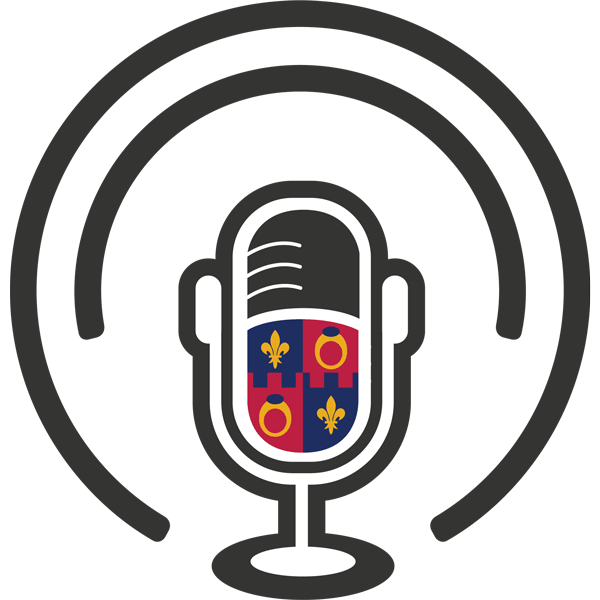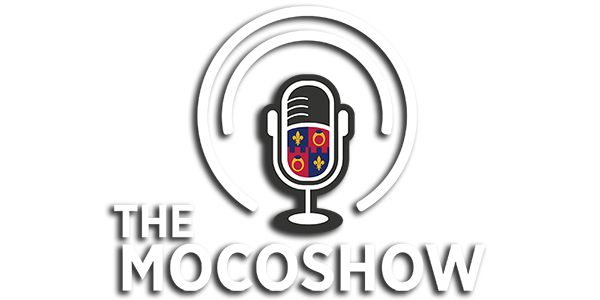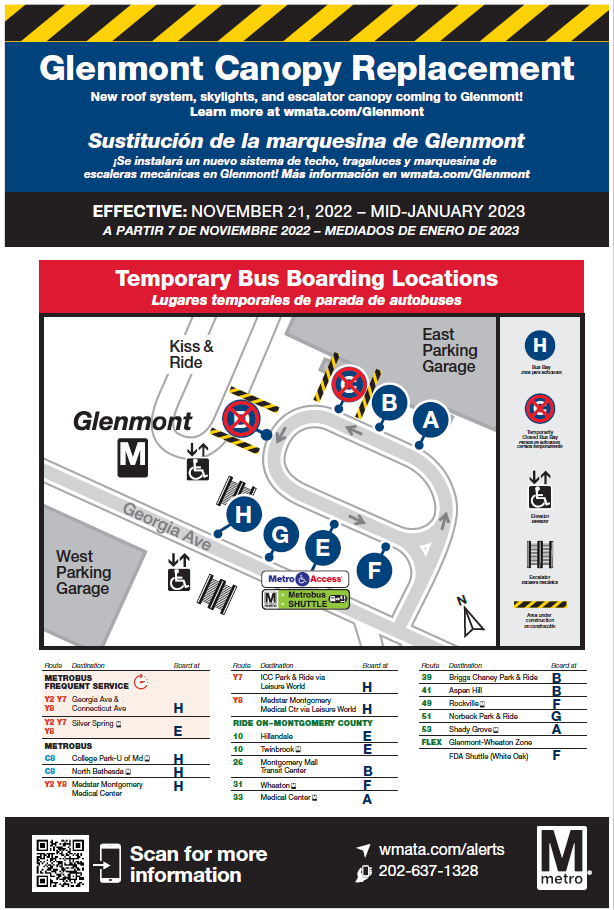Per MCDOT:
Last September, Metro began replacing the glass canopies at Glenmont Station. During glass canopy construction, some bays will be closed in phases and the associated bus routes will be temporarily relocated. Phase two of construction is set to begin on Monday, Nov. 7, and last through mid-January 2023.
Phase 2: From Monday, Nov. 7 to Mid-January 2023, Bus Bays C and D will be closed
- Metrobus Routes Y2 (Silver Spring), Y7 (Silver Spring), and Y8 (Silver Spring) normally at Bus Bay D will be relocated to Bus Bay E
- Metrobus Route C8 (College Park and North Bethesda) normally at Bus Bays E & F will be relocated to bus bay H.
- Metro Access and Metrobus Shuttle will be available at Bus Bay E
- Ride On Route 10 (Hillandale and Twinbrook) normally at Bus Bay F will be relocated to Bus Bay E
- Ride On Routes 31 (Wheaton) and 49 (Rockville) normally at Bus Bay C will be relocated to Bus Bay F
Fare collection resumed on all Montgomery County buses on August 1. The one-way pre-pandemic fare, which was $2 per ride, is now $1. Monthly passes, which were $45 per rider, are now $22.50 Riders can plan trips online with Ride On Real Time.
For the most up-to-date service information, riders should follow @RideOnMCT on Twitter, Facebook, YouTube, and Instagram. In addition, information is available at RideOnBus.com, by subscribing to receive email alerts at montgomerycountymd.gov/govdelivery, or texting MONTGOMERY RIDEON to 468311 to receive text alerts.
For more information on MCDOT programs and services visit montgomerycountymd.gov/mcdot, follow @MCDOTNow on Twitter, Facebook and Instagram and subscribe to MCDOT’s “Go Montgomery!” newsletter.
Per WMATA:
Metro has a message for fare evaders: operating buses and trains isn’t free. Customers riding Metrobus and Metrorail are required to pay fares and will be warned accordingly. Starting Oct.4 your Metro will begin a warning campaign to alert people who neglect to pay fares that there are fines associated with fare evasion in each jurisdiction.
The warning campaign will begin with notices displayed on digital signs throughout the system. After the digital signs run for two weeks, Metro Transit Police (MTPD) officers and other Metro personnel will start distributing physical fliers to fare evaders with the same warning information.
“As I mentioned previously, the region needs to decide what we want Metro to be, and fare policy should be part of the conversation,” said General Manager and Chief Executive Officer Randy Clarke. “Many people have mentioned going to a fare-free model, but fare-free does not mean free. There are costs associated with running the community’s transit system and therefore the necessary revenues must exist to deliver the services the community needs.”
Below is the warning that will appear on digital signage and on fliers:
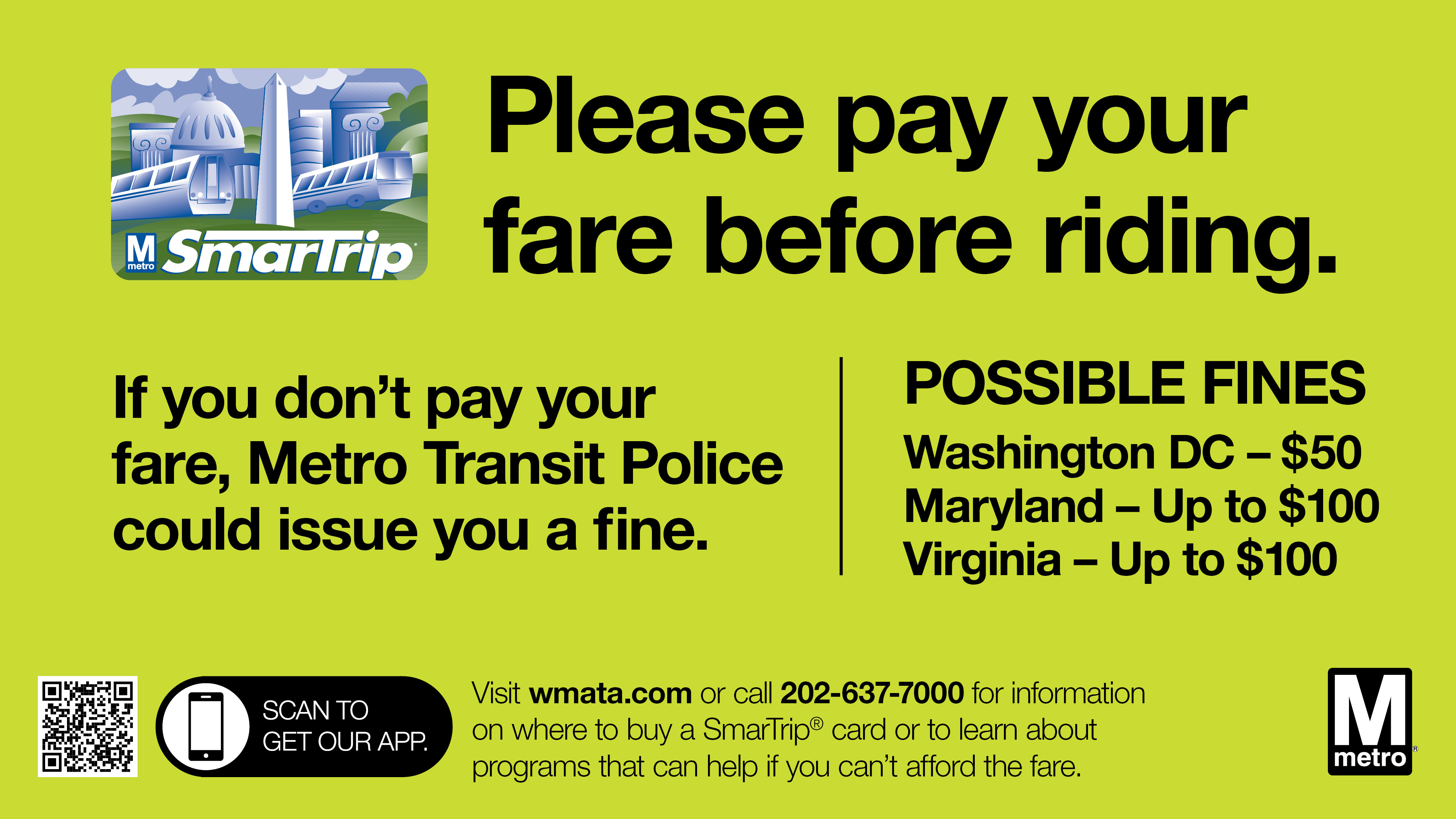
The warning period will conclude in November, and MTPD officers will issue citations to anyone caught not tapping SmarTrip® cards or mobile phones at fare gates, exiting emergency gates in stations and not tapping fare boxes on Metrobuses.
Fare recovery is a major issue and has been mentioned as one of the top concerns of customers when talking with Metro staff and Metro Board Members. Revenue from fares allows Metro to keep buses, trains and MetroAccess services running.
The campaign is designed to raise awareness of fines currently associated with Maryland and Virginia and inform fare evaders of the new civil penalties in the District that will take effect in November.
In Maryland and Virginia, fare evasion is a criminal offense, while the District has now put in place newly established procedures necessary for MTPD to proceed with enforcing civil citations systemwide.
Tickets are provided by each jurisdiction and until recent action in the District establishing an adjudication and appeals process, Metro did not have tickets to use in the District. Therefore, Metro did not have the ability to issue fare evasion citations in the District.
Fare evasion is responsible for significant revenue losses and is part of the focus to close a shortfall of nearly $185 million in the upcoming budget. Using data from Metrobus and pre-pandemic industry averages for Metrorail, Metro conservatively estimates revenue losses due to fare evasion totaling $40 million in fiscal year 2022 or 22 percent of the total upcoming budget gap. New faregate technology, currently being installed, will allow Metro to more accurately measure the scale of the problem.
Metro relies on fare revenue to maintain rail and bus service which is critical with a budget gap expected to grow to more than half a billion dollars by fiscal 2025. While some school systems in the region provide transit benefits, students are still required to tap their card to travel and be counted for Metro to receive the revenue. Children aged four years and younger are free. Those adults who don’t pay are subject to the fines and other penalties associated with failure to pay.
As part of the campaign, we are working with our local partners to offer resources to make public transit more equitable and affordable for those in need. A low-income fare pilot is getting underway in the District, in addition to a proposal to provide $100 in SmarTrip credit for qualified residents to ride buses and trains.
Metro is also exploring other methods that will prevent customers from entering rail stations without paying. In November, Metro is expected to begin testing faregate modifications as a preventative measure. Prototypes are in development and will be installed at a selected rail station for employees to test. Some of the modifications being explored include tactile deterrents on top of faregates and higher barriers. Once the initial round of employee testing is completed, customers will be able to try the modified faregate and provide feedback early next year.
For more information on the warning campaign, please visit wmata.com/paythefare.
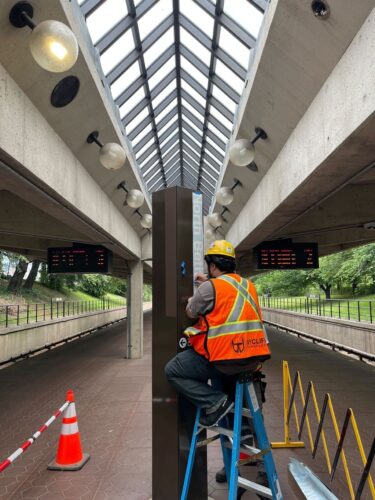
Per WMATA:
Beginning Sept. 11, Metro will implement five station name changes on signage and maps across the system as requested by local jurisdictions and approved by the Metro Board of Directors. Customers will see immediate changes on digital maps throughout rail stations and on bus displays as well as on wmata.com, Trip Planner, and Next Arrivals. Destination signs on Metrobuses and announcements also will recognize new station names. Static maps will be gradually updated once new Silver Line stations and Potomac Yard Station open for passenger service.
Five Station Name Changes:
- White Flint will become North Bethesda
- Largo Town Center will become Downtown Largo
- Tysons Corner will become Tysons
- Prince George’s Plaza will become Hyattsville Crossing
- West Falls Church secondary name VT/UVA will become VT only.
Physical station signage at White Flint and Largo Town Center has already undergone some changes to complete the process which requires fabrication and installation. Additionally, Metro is working with each jurisdictional partner to coordinate name change rollouts to minimize confusion for customers.
Metro encourages customers to sign up for MetroAlerts text or email messages to receive updated service information or follow us on Twitter @wmata, @Metrorailinfo, and @Metrobusinfo. To reach the customer service center, call 202-637-7000 or use the chat feature at wmata.com.
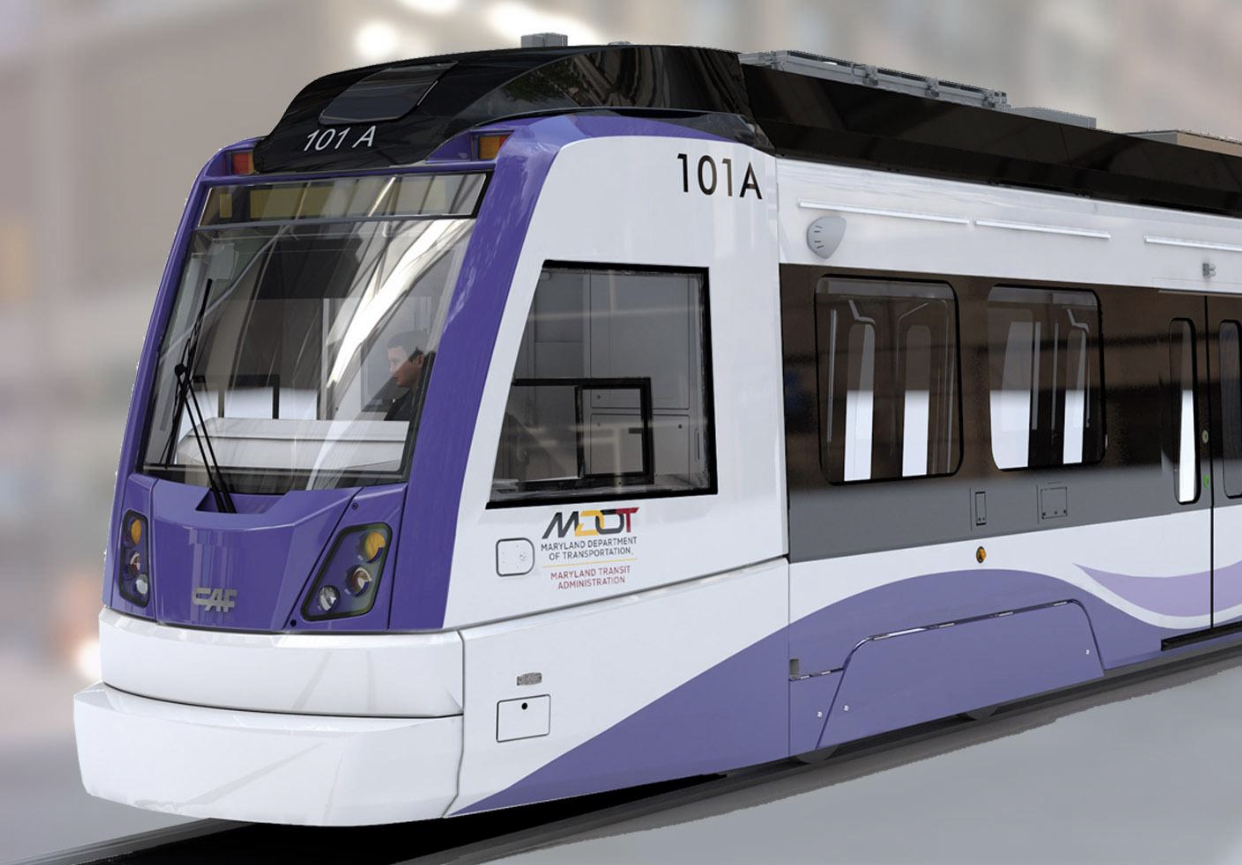
Per Montgomery County:
Progress of continuing work on the Purple Line, including introduction of the new contractor, are the focus of a series of in-person meetings being held by the Maryland Department of Transportation Maryland Transit Administration (MDOT MTA). The State department is managing the project.
The meetings are open to the public and questions are permitted during the question-and-answer portion of the meeting. The next meeting is scheduled for 7-8:30 p.m. on Tuesday, June 7, at North Chevy Chase Elementary School. The school is located at
3700 Jones Bridge Road in Chevy Chase.
The Purple Line will be a 16-mile light rail line that will extend from Bethesda in Montgomery County to New Carrollton in Prince George’s County. It will provide a direct connection to the Metrorail Red, Green and Orange Lines at Bethesda, Silver Spring, College Park, and New Carrollton. The Purple Line also will connect to MARC, Amtrak and local bus services. The revised planned completion date is 2026.
MDOT MTA is planning community meetings, open houses and Community Advisory Meetings (CATs) to give residents updates on the Purple Line. Additional information is available on the project’s website at purplelinemd.com/upcoming-meetings.
At the meetings, MDOT MTA will introduce the community to the new design-build contractor, Maryland Transit Solutions (MTS). Meeting attendees also will have the opportunity to ask questions and hear updates.
Among the issues that will be discussed are ongoing construction activities and the maintenance of traffic during construction (including planned detours, if applicable.
The schedule of future community meetings regarding the Purple Line:
- Bethesda/Chevy Chase (CAT). Tuesday, June 7, 7-8:30 p.m. North Chevy Chase Elementary School, 3700 Jones Bridge Road, Chevy Chase.
- Greater Lyttonsville/Woodside (CAT). Tuesday, June 14, 7-8:30 p.m. Rosemary Hills Elementary School, 2111 Porter Road, Silver Spring.
- Silver Spring (CAT). Tuesday, June 21, 7-8:30 p.m. Silver Spring International Middle School, 313 Wayne Avenue Silver Spring.
- Long Branch (CAT). Tuesday, June 28, 6:30-8 p.m. Oak View Elementary School,
- 400 East Wayne Ave., Silver Spring.
The Purple Line team is returning to in-person meetings to engage in meaningful dialogue about the project. Specific questions also can be sent to MDOT MTA’s Outreach Team 10 days in advance of a meeting date. The Purple Line Outreach Team can be contacted at 443-451-3706 or via email at [email protected].
Learn more about the Purple Line project here

The Purple Line Transit Partners announced on Thursday that they have secured funding to complete the remainder of construction on the Purple Line, as well as for future operations and management. The purple line is a 16-mile light-rail line with 21 stations that will go from Bethesda New Carrollton in Prince George’s County.
Press Release:
Riverdale Park, MD – Purple Line Transit Partners (PLTP), in close coordination with the Maryland Department of Transportation Maryland Transit Administration (MDOT MTA), announced financial close, which secures funding for the remainder of construction as well as for future operations and maintenance.
“Our rock-solid partnership with MDOT MTA is the reason we’re able to make today’s announcement, which brings the Purple Line an important step closer to serving the people of Maryland,” said Jane Garvey, PLTP chairman. “Leading up to today’s milestone, ‘Team Purple Line’ has spared no effort to ensure the restart of construction hits the ground running.”
Soon after financial close, full-scale construction will resume to complete the 21-station light rail line by fall 2026. Later this spring and summer, neighboring residents and business will witness a resumption of activity on major project elements, including stations, overpasses, tunnels and track installation.
As the new design-build contractor, Maryland Transit Solutions (MTS), was being procured, MDOT MTA continued with design refinements, utility relocations and other priority activities such as the Sleaford Road underpass in Bethesda-Chevy Chase and the Campus Drive Metro bus loop in College Park.
“We are excited to start a new chapter and deliver the Purple Line to Maryland,” said MDOT MTA Administrator Holly Arnold. “There will be a noticeable increase in construction activity later this spring and summer as this critical project moves forward. The Purple Line will revolutionize transportation in the Washington, D.C. region, with convenient service within an interconnected transit system.”
Since MTS was selected in November 2021, MDOT MTA, PLTP and MTS have been meeting frequently to smoothly transition responsibilities and plan for the efficient mobilization of construction for the 16.2-mile light rail line.
The financing arranged by PLTP for the 40-year agreement to finance, design, build, operate and maintain the Purple Line, supported by annual payments by MDOT MTA during operations, is as follows:
• $1.76 billion: Transportation Infrastructure Finance and Innovation Act (TIFIA) loan from the U.S. Department of Transportation to PLTP, replacing and restructuring the original TIFIA loan;
• $643 million: Private Activity Bonds issued to PLTP; and
• $293 million: Total PLTP shareholder equity.
The Purple Line will provide rapid, convenient transit service between New Carrollton in Prince George’s County and Bethesda in Montgomery County. The east-west line will connect with five branches of Metrorail, three MARC commuter rail lines, Amtrak and a host of bus services. As it supports community revitalization and transit-oriented development, the Purple Line also will help reduce dependence on auto travel.
PLTP is headquartered in Riverdale, Maryland and holds the Public-Private Partnership Agreement (P3 Agreement) with MDOT MTA to design, build, finance, and operate the Purple Line light rail project. PLTP is comprised of majority partner Meridiam and Star America. Meridiam is an asset manager specializing in the development, financing, and long-term management of sustainable public infrastructure with $18 billion of assets under management and more than 100 projects to date. Star America Infrastructure Partners, LLC (a subsidiary of Tikehau Capital), the investment advisor to Star America Purple Line and its affiliates, is a U.S.-headquartered developer and manager of infrastructure assets in North America with a track record of investments in 16 infrastructure assets that have a total project cost valued at greater than $5 billion as of December 31, 2021.
Part of multi-billion-dollar capital investment in 2022
As Metro prepares for the opening of both the Silver Line Extension and Potomac Yard Station in 2022, the transit authority will also advance its intensive state of good repair program. This includes completion of the multi-year platform reconstruction effort at 20 outdoor rail stations and several large-scale construction projects, including a major rehabilitation of the Yellow Line’s Potomac River tunnel and bridge crossing.
Metro will soon introduce new service on the Silver Line – including six new rail stations, 12 miles of track, and a new rail yard. And this summer, platform reconstruction and station improvements will be underway on the eastern end of the Orange Line.
In September, the construction of new tracks to connect the future Potomac Yard Station to the mainline tracks will be completed, along with performance and safety testing required prior to the start of service. The station is expected to open this fall.
A major rehab of the Yellow Line tunnel and bridge will begin concurrently in September. Metro’s chief engineer has identified the steel-lined tunnel near L’Enfant Plaza as the agency’s top structural priority, with repairs needed to stop water intrusion and strengthen the tunnel lining. Metro will also remove and rewire miles of critical communications cabling used by multiple jurisdictions and make repairs to the Yellow Line bridge. The project and associated bridge closure is expected to begin in September and be completed in spring 2023.
“In order to maintain a healthy system, Metro needs an aggressive capital program. We will continue working with our regional partners to advance construction and rehabilitation projects that ensure a state of good repair for critical regional infrastructure. While service outages can be disruptive, we know they are foundational for maintaining safe and reliable service,” said Metro General Manager and Chief Executive Officer Paul J. Wiedefeld. “We have a lot of work to do this year and we will tackle major state of good repair projects while also introducing new service. We are committed to providing our customers with reliable alternatives and frequent updates on the work as it is conducted.”
The capital project schedule for 2022 includes the following projects with rail service impacts:
- Platform Improvement Project, May 28 – Sept. 5, 2022*: New Carrollton, Landover, Cheverly, Deanwood and Minnesota Ave stations will be closed with no rail service. Free shuttle bus service will be available at the five closed stations. Stadium-Armory Station will be the eastern terminus of the Orange Line during this time.
Metro will demolish and reconstruct the aging concrete platforms at three outdoor stations — New Carrollton, Landover and Cheverly. Two adjacent stations – Deanwood and Minnesota Ave – will also be closed during this time and will receive upgraded safety and customer experience improvements. Taking advantage of the shutdown, at the same time aerial structures will be repaired and strengthened at numerous locations in the area. Learn more about the project and summer 2022 travel alternatives, and sign up for updates at wmata.com/platforms.
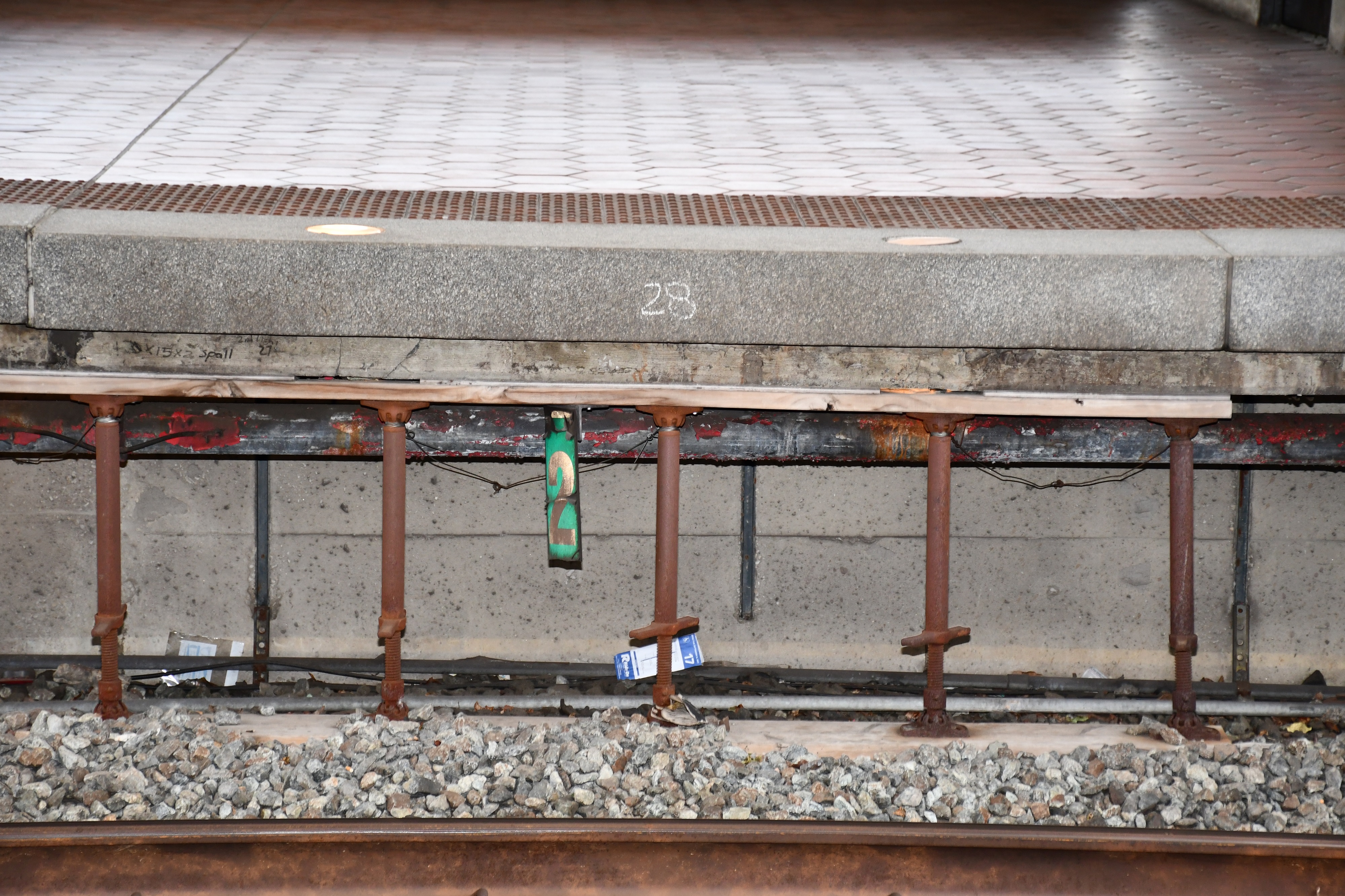 |
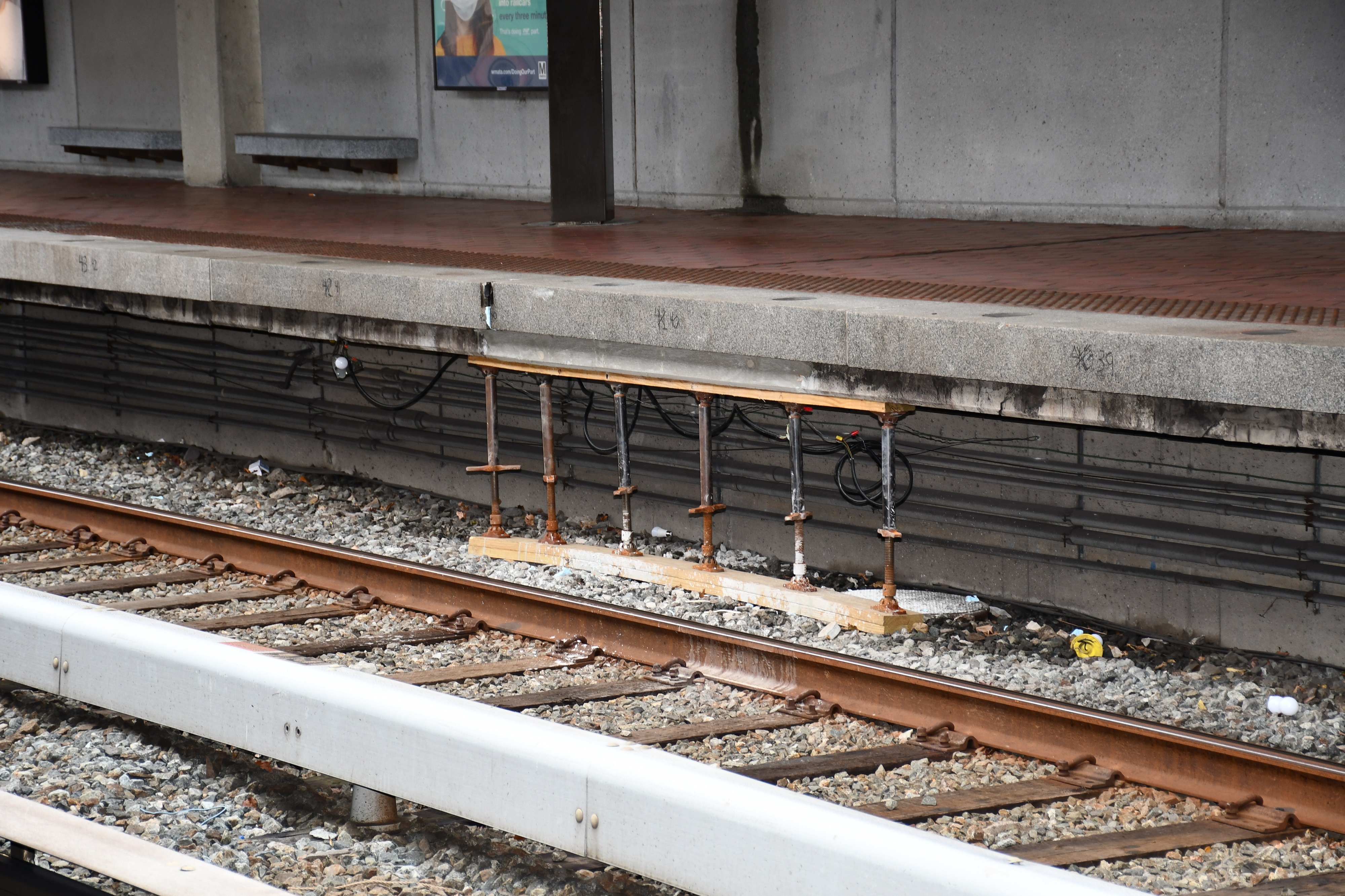 |
- Potomac Yard Station, Sept. 10 – Oct. 22, 2022: Potomac Yard Station construction will require a six-week shutdown of rail service south of Washington National Airport station to build new tracks that “tie-in” the new station with the existing Metrorail system. Engineering, testing, and commissioning needed to integrate the track, power, communications and signal systems into the system will also be conducted during this time. This will be followed by additional testing and training to determine when service can begin.
- Yellow Line Tunnel and Bridge Rehab, beginning Sept. 10, 2022: This work will require a shutdown between Pentagon and L’Enfant Plaza stations, closing the Yellow Line crossing of the Potomac River for seven to eight months. During that time, crews will rehabilitate the Yellow Line Bridge spanning the Potomac River and repair the steel lined tunnels between Pentagon and L’Enfant Plaza stations, both of which date to original construction more than 40 years ago. Exact service plans will be released later this year as construction plans are finalized.
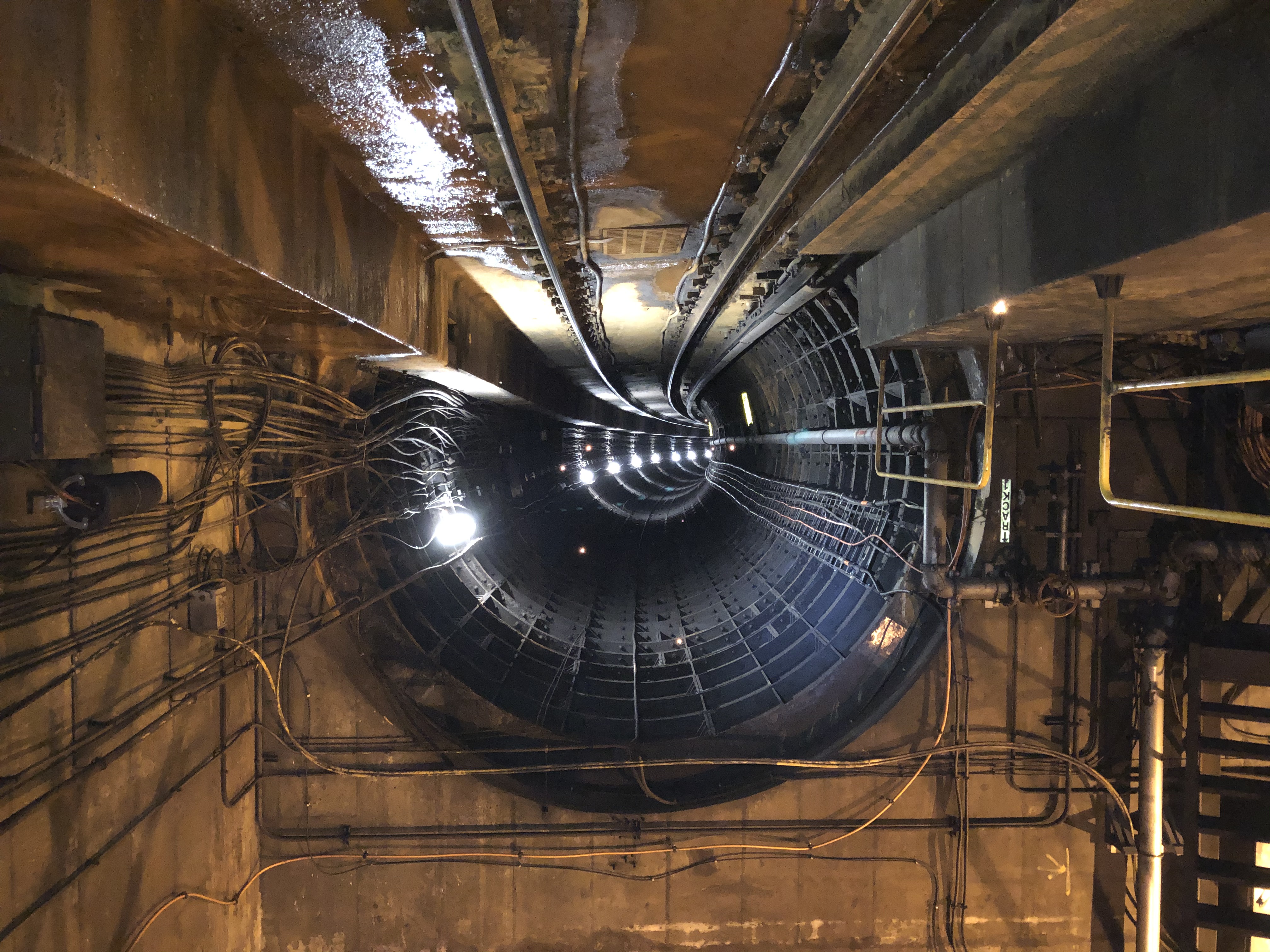 |
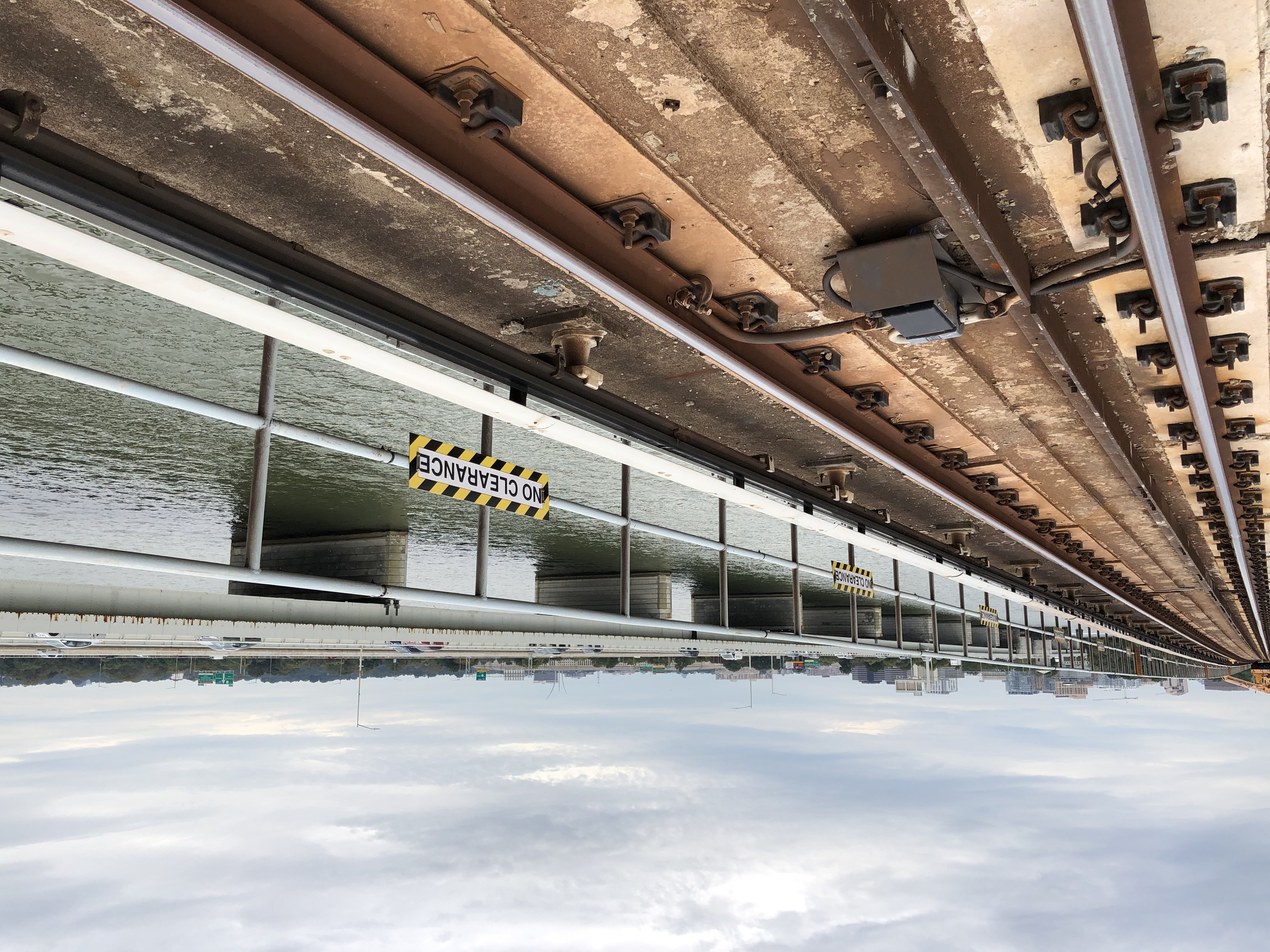 |
Additional work will be completed in 2022 during weekend shutdowns and single tracking, including:
- Replacement of drainage pumping stations and discharge line piping at critical locations, including Medical Center, Wheaton, Metro Center, Federal Triangle and L’Enfant Plaza stations
- Tunnel leak mitigation work between Silver Spring and Forest Glen, and between Tenleytown and Friendship Heights
- Tunnel ventilation pilot project’s final phase between Cleveland Park and Woodley Park; part of Metro’s effort to improve tunnel safety by upgrading the ventilation system and responsive to a National Transportation Safety Board (NTSB) directive following the 2015 smoke incident at L’Enfant Plaza
Construction schedules are tentative and subject to change. As Metro works with the local jurisdictions to plan travel alternatives and communicate with customers and communities, additional information on service impacts, free bus shuttles, supplemental bus service, and other mitigation measures and travel options will be provided to the public approximately three months prior to the start of service impacts. Extensive outreach campaigns are conducted for all major projects to ensure customers and community members are aware of the upcoming changes and can plan ahead.
Metro’s Capital Program
Through a 10-year, $15 billion capital program, Metro is investing in system safety, dependability, and the region’s economy. The capital program totals more than $2 billion in Fiscal Year 2023 and is now one of the largest in the U.S. transit industry. The program advances projects to enhance the customer experience by investing in station and platform improvements, new railcars and buses, upgrading fire-suppression and emergency response systems, replacing, and repairing tracks, tunnels, bridges, signals, and communications systems, rebuilding decades-old bus garages and providing modern customer amenities such as digital passenger information systems. The capital program is supported by dedicated funding from Maryland, Virginia, and the District of Columbia, which allows Metro to reinvest in the local economy, creating jobs and encouraging participation from disadvantaged, minority-owned, and small businesses in the region.
On Friday, Montgomery County officials dedicated the “MD 355 Crossing Project” in Bethesda. The new underpass provides safe crossing between the Walter Reed National Military Medical Center, the National Institutes of Health (NIH) and the Medical Center Metrorail station.
The underpass is named after the late Phil Alperson, a former MCDOT employee who worked for years to coordinate the project.
Montgomery County Executive Marc Elrich, Council President Gabe Albornoz, Councilmember Andrew Friedson, Councilmember Will Jawando and U.S. Senator Chris Van Hollen were among those in attendance.
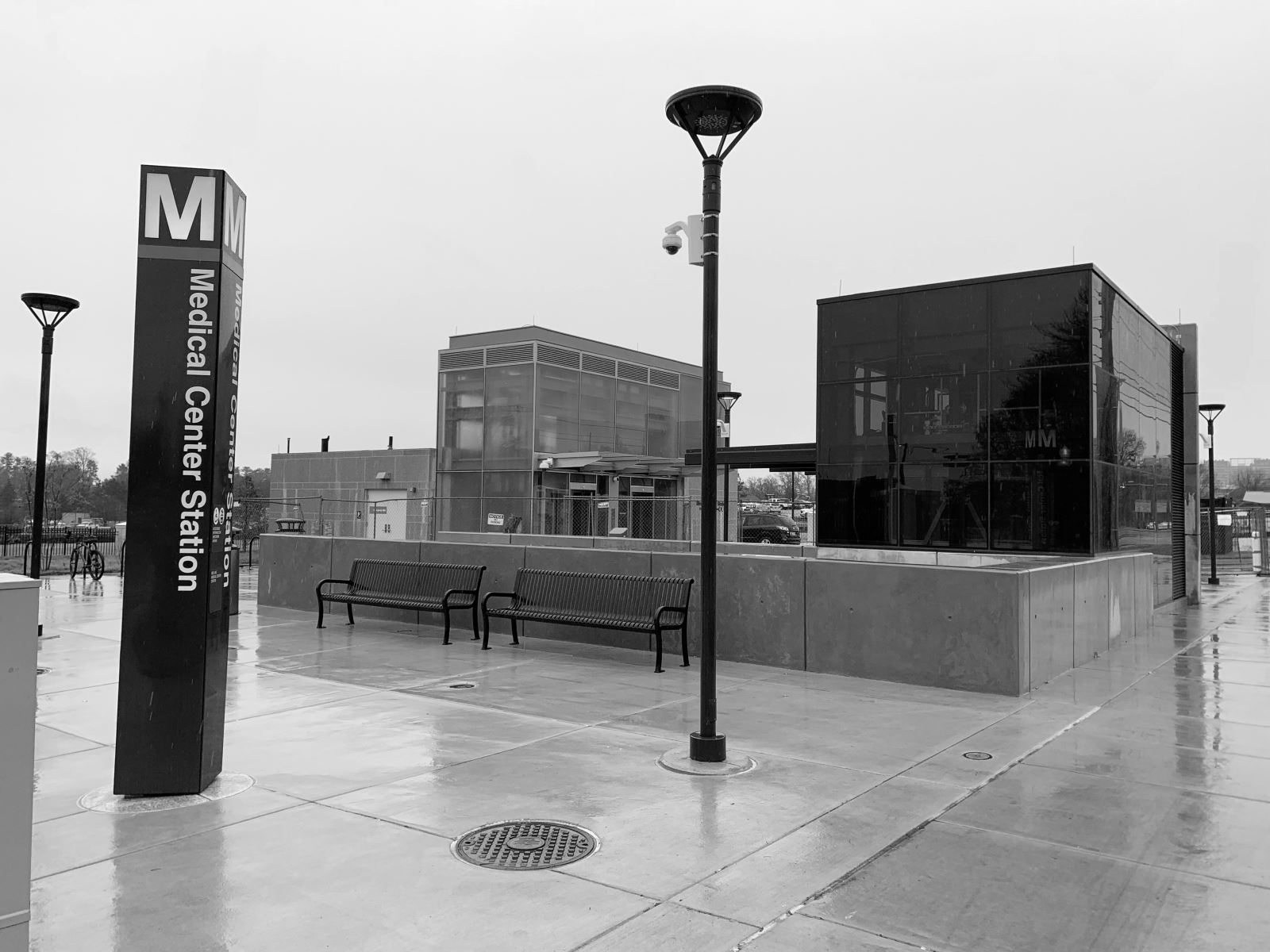
Per MCDOT:
The MD 355 Crossing Project was managed by the Montgomery County Department of Transportation (MCDOT) and includes a shallow pedestrian underpass below MD 355 (Rockville Pike) that will provide pedestrians and cyclists a safe means of crossing the busy roadway. The project also includes new deep high-speed elevators and emergency stairs creating direct access between the station and the east side of MD 355 and a new elevator and staircase between the existing Metrorail platform and mezzanine levels.
In addition, the project includes roadway surface improvements such as a traffic signal, pavement resurfacing, sidewalk/bike path, median work and stormwater management facilities were completed.
Naval Support Activity Bethesda and Walter Reed National Military Medical Center was established in 2011 and became the second-largest employer in Montgomery County. The first largest employer is NIH, which is located on the opposite side of MD 355. Thousands of pedestrians cross 355 to get between the campuses and to the Medical Center Metrorail station, which is located on the NIH side. Pre-COVID numbers indicate that the Medical Center Metrorail station accommodated approximately 11,000 riders daily. About 7,000 pedestrians cross MD 355 daily to get to the Metro stop.
Metro is installing new faregates at rail stations and will begin upgrading fareboxes on Metrobuses in the fall. This investment in new technology means a faster, more efficient and reliable experience for you. As a result, beginning March 1, 2022, SmarTrip cards purchased before 2012 will no longer work and must be replaced.
If you’re using SmarTrip in your mobile wallet, you’re all set – just tap and go.
To accommodate customers SmarTrip card replacements, the Metro Center Sales Office hours of operation have been extended to 8am – 3pm Monday – Friday until further notice. The sales office is located at Metro Center Station – Enter at 12th & F Streets, NW Washington, DC 20005.
Step 1: See if Your Plastic Card Needs to be Replaced.
Check the back of your card. If you don’t see a set of numbers that begins with 0167, you must replace your card.
Step 2: Take Action if Your Plastic Card Needs Replacing.
Have You Registered Your SmarTrip Card to Preserve Your Balance?
Please register your card to ensure your balance stays protected. If you prefer not to register your card, be sure to take a picture or make a copy of the back of your card to note the serial number before proceeding.
If you are not currently riding Metro and don’t have SmartBenefits on your card:
Don’t need your card right away? Mail us your SmarTrip card to have the balance transferred to a new card.
We’ll mail the new card to you within 10 business days to use in the Metro system. Download the Form Here![]() to get started.
to get started.
If you are actively using the Metro system:
Transfer your balance to an eligible SmarTrip card or request a new card here.
If you currently have SmartBenefits on your SmarTrip card:
SmartBenefits participants cannot transfer balances using the mail-in or in-person process. Please use our online balance transfer process to replace your first generation SmarTrip card.
If you need further assistance, see below for our Frequently Asked Questions or call SmarTrip customer service: 1-888-SMARTRIP (1-888-762-7874).
Frequently Asked Questions
My card matches the types that need to be replaced, when do I need to replace it?
We recommend replacing your card as soon as possible to avoid any disruption in the future should you ride at a station that has the new faregates installed. Click here to see the upcoming stations where the faregates will be replaced, as well as a list of the stations with the new faregates and to learn more about the project.
Can I replace my card in-person somewhere?
Visit our Metro Sales Office located at the Metro Center Station to replace your card in-person if your card does not have SmartBenefits. The Metro Sales Office is open Tuesday through Thursday from 8am-12pm.
Can I replace my card online?
If you are a SmartBenefits participant, you can initiate the online card replacement process at any time.
If you are not a SmartBenefits participant, then your first-generation card must be tapped at a faregate, bus fare box, or fare vending machine to complete the balance transfer. For those who aren’t currently riding Metro and do not have SmartBenefits on their card, our mail-in option is the best replacement method as it doesn’t require you to visit a station or bus to complete the balance transfer.
If you do use the online replacement process, then you must use your new card within 30-days to complete the balance transfer. Please plan accordingly.
I have another SmarTrip card that is a newer generation, can I transfer my balance to that card?
Yes, click here to replace your older SmarTrip card and transfer your balance.
What happens if I don’t replace my first generation SmarTrip card?
Older SmarTrip cards that match the formats noted here will not be compatible with our new faregates, so you will be unable to enter or exit the system.
I have SmartBenefits on my first generation SmarTrip card, but I only use my card for vanpool, commuter rail, or commuter bus. Do I still need to replace my card?
If you allocate all your SmartBenefits to a vanpool or for use on commuter rail or commuter bus, then we recommend that you replace your first generation SmarTrip card to keep current with our new technology. However, you will not be required to replace your card if you do not travel on Metro or with one of Metro’s regional partners.
Can I replace my first generation SmarTrip card at Commuter Stores or retail outlets?
Unfortunately, first generation SmarTrip cards can only be replaced in-person at our Metro Sales Office located at the Metro Center Station.
Can I transfer the balance on my first generation SmarTrip card to a mobile SmarTrip card?
If you are actively riding the system and have a SmarTrip card in your mobile wallet, you can transfer the balance of your first generation card to it. First, make sure your mobile SmarTrip card is added to your account at SmarTrip.wmata.com, then transfer your balance to the mobile SmarTrip here.
What if I have a commemorative card and I don’t want to mail it in?
If you are actively riding the system, you can transfer your balance online to another SmarTrip or request to have a new card mailed with your remaining balance. If you have not ridden Metrorail or Metrobus in the last 7 days: whenever you are ready, simply tap your SmarTrip card at any fare vending machine, fare gate, or bus farebox and follow the steps to transfer your balance online to another SmarTrip.
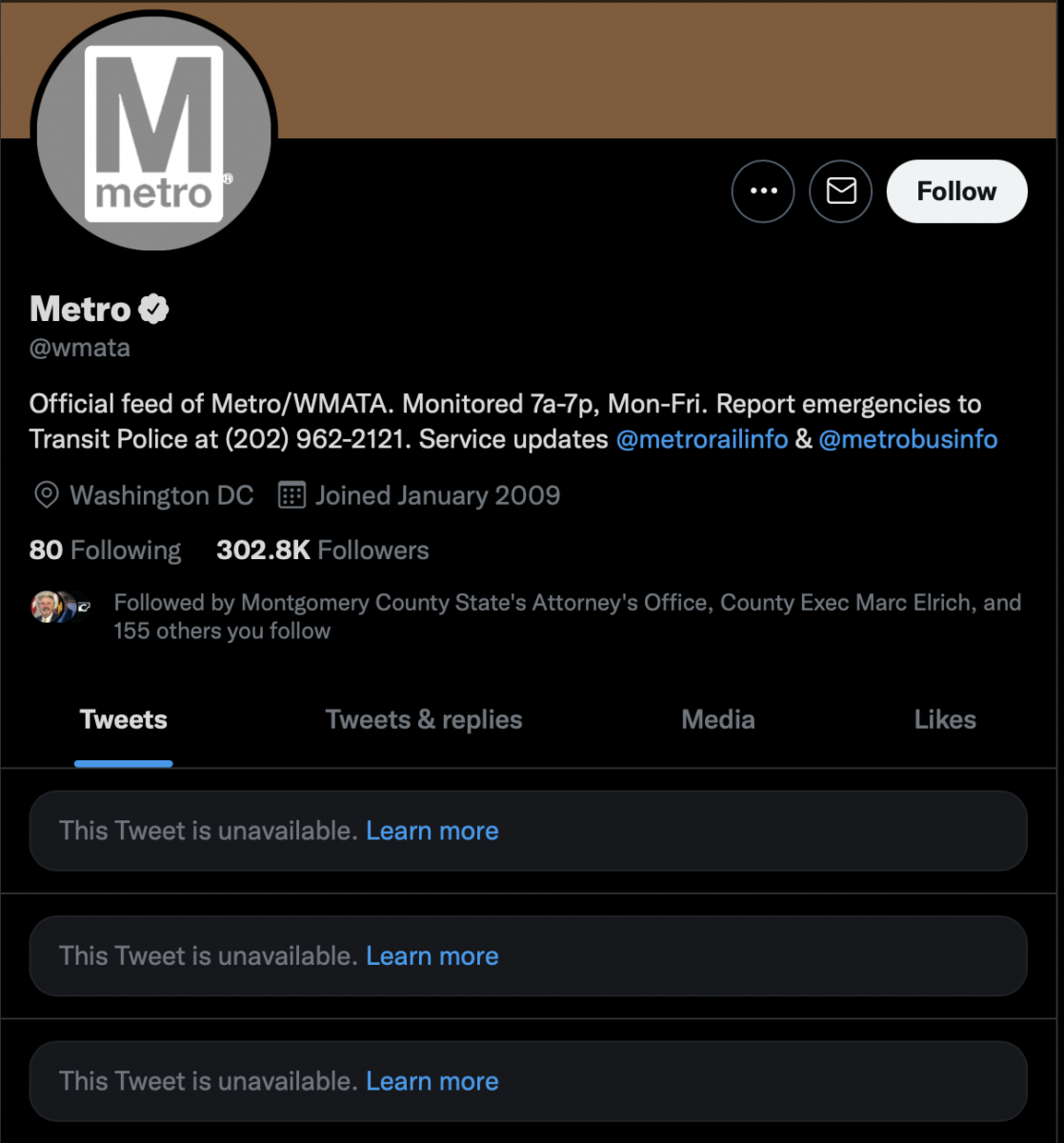
Two of the Washington Metropolitan Area Transit Authority’s Twitter accounts were hacked early this morning, leading to obscene tweets by someone who claimed they were fired as the social media manager for the accounts.
The hacker sent obscene and profanity laced tweets on Metro’s official Twitter page and its Metrorail page in the early morning hours Monday morning. Metro’s main account, @WMATA, was changed from “Metro” to “Blueface Da Bus.” The @metrorailinfo account was also hacked.
As of 8:20 AM the tweets have been deleted, but a few retweets remain, some containing profanity.
Metro officials have released the following statement, acknowledging the hacked accounts and are working to figure out who is responsible:
“We are aware that Metro’s Twitter accounts @WMATA @MetrorailInfo were hacked and obscene posts were made that do not represent Metro’s organization or culture. The posts will be removed, and our account will be secured. We are working to understand who may be responsible for this breach.”
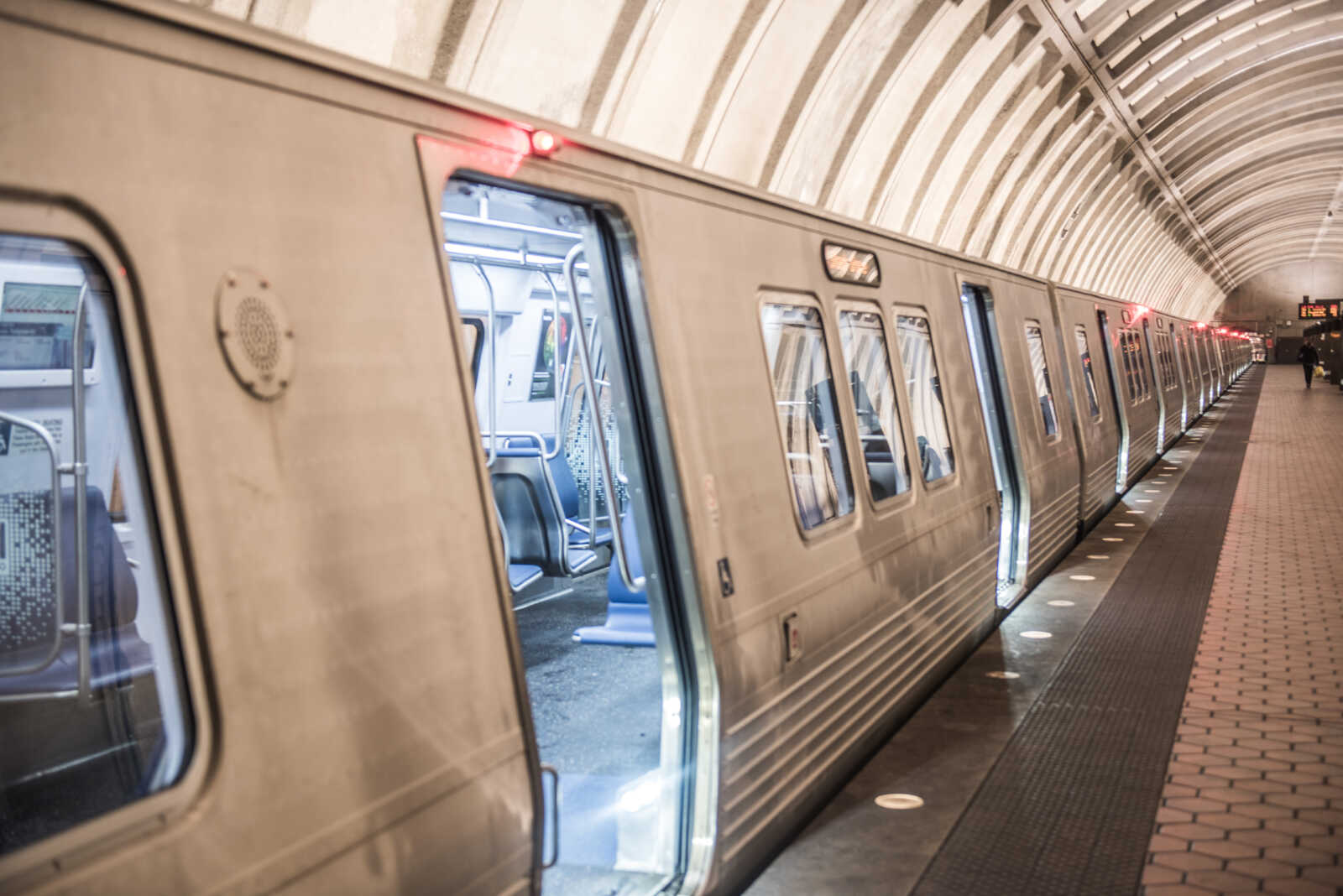
Metro will increase rail service on the Red Line beginning Tuesday, February 22, building on recent weekday service improvements on the Blue, Orange, and Silver lines to provide customers with more frequent and reliable service.
On weekdays, Red Line trains will operate every 10 minutes instead of every 12 minutes. Trains are operating every 20 minutes on all other lines, with trains as frequently as every seven to 10 minutes at stations that are served by multiple lines throughout the system.
“We know every minute counts when you have somewhere to be, so we’re working hard to safely put as many trains into service as possible,” said General Manager and Chief Executive Officer Paul J. Wiedefeld. “We thank our customers for their continued support as we work to do our part to support the region’s recovery.”
Since pausing the return of the 7000-series fleet to focus on root cause analysis, rail maintenance staff have concentrated on restoring more of the legacy fleet (2000-, 3000-, and 6000-series) to improve reliability.
Customers can find the latest service information through website updates, social media posts, digital signage, in-station audio announcements, and alerts. Sign up for MetroAlerts text or email messages to receive the latest service information, follow us on Twitter @MetrorailInfo, or check wmata.com.
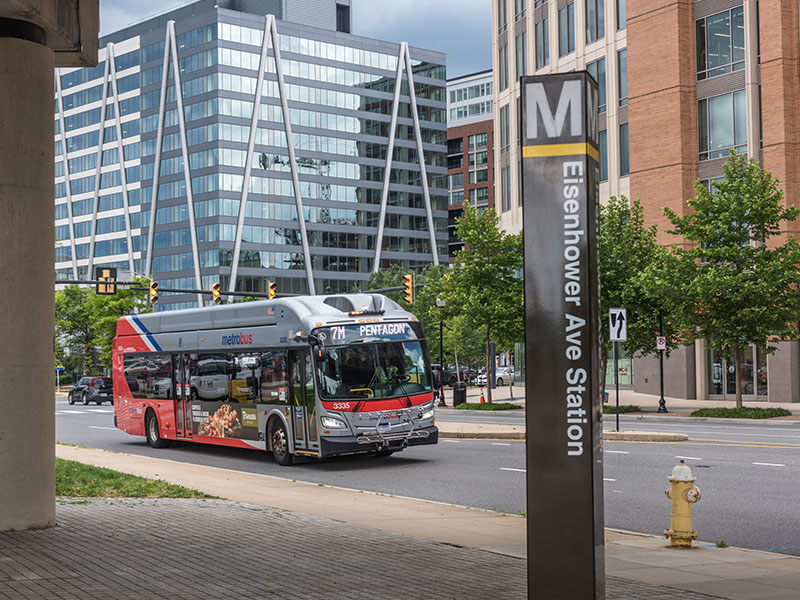
On Presidents Day, Monday, February 21, 2022, Metrorail will operate on a Saturday schedule and Metrobus will run Saturday supplemental service. MetroAccess customers who wish to travel on the holiday may make a reservation; however, subscription trips will be canceled.
Customers are advised to be aware of scheduled track work on the Blue and Yellow lines, closing the six stations south of Reagan National Airport. Free shuttle buses will be provided to/from the closed stations. View the weekend service advisory for additional information.
Service Information
Metrorail: Rail stations will open at 5 a.m. and close at midnight, with trains operating on a Saturday service schedule.
Trains every 12 minutes.
Trains every 24 minutes.
Trains every 20 minutes.
Parking will be free at all Metro owned parking facilities and off-peak fares will be in effect all day.
Metrobus: Buses will run Saturday supplemental service. All routes that normally operate on a Saturday will operate, with additional service on some routes. Schedules vary by routes, check timetables for service information.
MetroAccess: Metro’s paratransit service will operate regularly scheduled hours during the holiday. Subscription trips will be canceled; however, customers traveling on the holiday may book a trip online or by calling 301-562-5360 (TTY 301-588-7535).
Metro Customer Relations: Metro’s customer relations call center will be closed Monday in observance of the holiday. Automated travel information is available 24/7 by calling (202) 637-7000.
